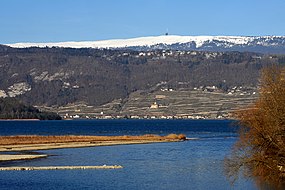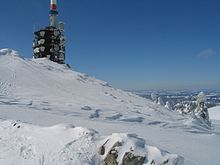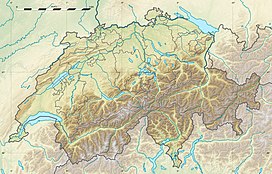The Chasseral is a mountain of the Jura Mountains, overlooking Lake Biel in the Swiss canton of Bern. With an elevation of 1,606 metres above sea level, the Chasseral is the highest summit in the canton of Bern outside the Alps. It is also both the northernmost and easternmost mountain reaching over 1,500 metres in the Jura Mountains. West of the summit is located the Chasseral Ouest (1,552 m), where runs the border with the canton of Neuchâtel. The Chasseral Pass is located further on the west.
| Chasseral | |
|---|---|
 View from Lake Biel (south side) | |
| Highest point | |
| Elevation | 1,606 m (5,269 ft)[1] |
| Prominence | 666 m (2,185 ft)[2] |
| Parent peak | Crêt de la Neige |
| Isolation | 49.5 km (30.8 mi)[3] |
| Coordinates | 47°07′59″N 7°03′34″E / 47.13306°N 7.05944°E |
| Geography | |
| Location | Bern, Switzerland |
| Parent range | Jura Mountains |
The Chasseral is the fourth most topographically isolated mountain of Switzerland, although it is the first when considering only easily accessible summits. This results in a very extensive view over the other mountains of the Jura, the Swiss Plateau, the Alps, the Vosges and the Black Forest. The summit can be reached from the Chasseral hotel, where there is a bus stop.

Climate
edit| Climate data for Chasseral, elevation 1,594 m (5,230 ft), (1991–2020) | |||||||||||||
|---|---|---|---|---|---|---|---|---|---|---|---|---|---|
| Month | Jan | Feb | Mar | Apr | May | Jun | Jul | Aug | Sep | Oct | Nov | Dec | Year |
| Mean daily maximum °C (°F) | 0.3 (32.5) |
−0.1 (31.8) |
2.3 (36.1) |
5.8 (42.4) |
10.1 (50.2) |
13.7 (56.7) |
15.8 (60.4) |
15.6 (60.1) |
11.7 (53.1) |
8.4 (47.1) |
3.7 (38.7) |
1.2 (34.2) |
7.4 (45.3) |
| Daily mean °C (°F) | −2.3 (27.9) |
−2.8 (27.0) |
−0.5 (31.1) |
2.5 (36.5) |
6.4 (43.5) |
10.0 (50.0) |
12.0 (53.6) |
12.1 (53.8) |
8.4 (47.1) |
5.5 (41.9) |
1.1 (34.0) |
−1.4 (29.5) |
4.3 (39.7) |
| Mean daily minimum °C (°F) | −4.7 (23.5) |
−5.2 (22.6) |
−3.0 (26.6) |
−0.3 (31.5) |
3.5 (38.3) |
7.0 (44.6) |
8.9 (48.0) |
9.3 (48.7) |
5.9 (42.6) |
3.0 (37.4) |
−1.3 (29.7) |
−3.8 (25.2) |
1.6 (34.9) |
| Average precipitation mm (inches) | 95.8 (3.77) |
91.8 (3.61) |
96.6 (3.80) |
103.7 (4.08) |
133.6 (5.26) |
133.5 (5.26) |
136.4 (5.37) |
142.4 (5.61) |
116.6 (4.59) |
122.2 (4.81) |
110.4 (4.35) |
112.7 (4.44) |
1,395.7 (54.95) |
| Average precipitation days (≥ 1.0 mm) | 11.1 | 9.9 | 10.7 | 11.2 | 13.9 | 12.7 | 12.5 | 12.1 | 10.7 | 12.7 | 11.3 | 12.5 | 141.3 |
| Average relative humidity (%) | 75 | 76 | 79 | 79 | 82 | 82 | 81 | 81 | 84 | 80 | 78 | 76 | 79 |
| Mean monthly sunshine hours | 98.0 | 104.7 | 140.0 | 156.5 | 163.6 | 180.0 | 202.2 | 189.2 | 150.1 | 130.8 | 93.4 | 85.3 | 1,693.8 |
| Percent possible sunshine | 36 | 36 | 38 | 39 | 36 | 39 | 43 | 44 | 40 | 39 | 34 | 33 | 39 |
| Source 1: NOAA[4] | |||||||||||||
| Source 2: MeteoSwiss[5] | |||||||||||||
See also
editReferences
edit- ^ Retrieved from the 1:25,000 Swisstopo topographic map.
- ^ Approximation. The key col is located between Les Verrières and Saint-Sulpice at approximately 940 metres. See Swisstopo maps
- ^ Retrieved from Google Earth. The nearest point of higher elevation is near the Pfyffe.
- ^ "World Meteorological Organization Climate Normals for 1991–2020". World Meteorological Organization Climatological Standard Normals (1991–2020). National Oceanic and Atmospheric Administration. Archived from the original on 11 December 2024. Retrieved 11 December 2024.
- ^ "Climate Normals Chasseral (Reference period 1991−2020)" (PDF). Swiss Federal Office of Meteorology and Climatology, MeteoSwiss. Retrieved 21 January 2022.
External links
edit
